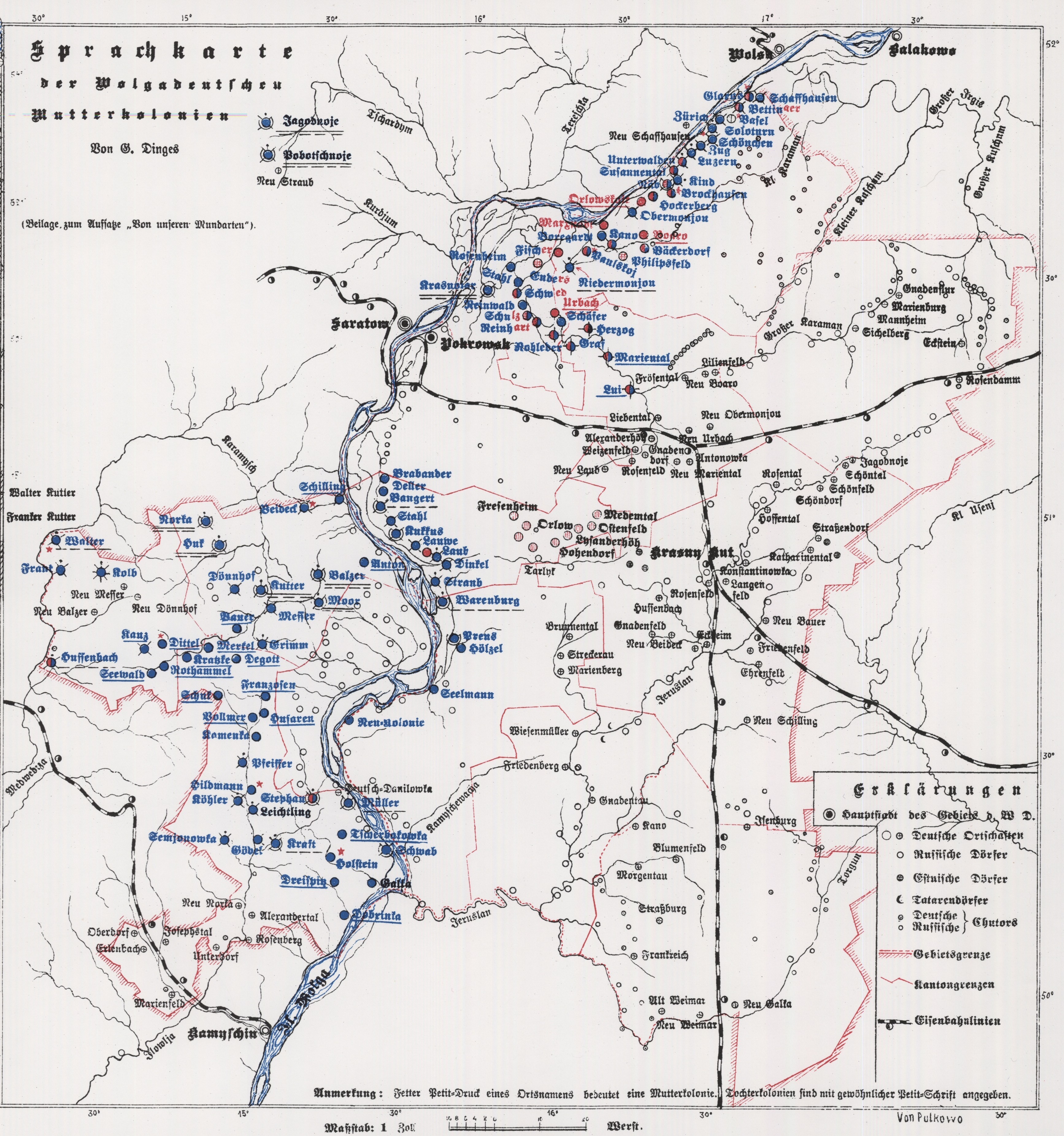"German-Russian communities were held together by specific human and divine values. Not least among these values were their dialects which were couched in spiritual, moral and ethical beliefs and feelings."
- Prof. Arnold H. Marzolf, from his book titled Let's Talk German-Russian with Ernschtina un Hanswurscht
The Volga Germans migrated from a variety of different locations in Western Europe and brought to Russia their unique local dialects. Given their isolation from other German speaking people, their linguistics remained largely unchanged during their settlement in Russia, only influenced by Russian borrow words.

LANGUAGE DEATH AMONG THE VOLGA-GERMAN COMMUNITIES IN ELLIS COUNTY, KANSAS
The town of Hays, KS, located in Western Kansas along I-70, is surrounded by Volga-German settlements founded in the late 1800's, such as Pfeifer, Liebenthal, Katherinenstadt, Schoenchen, Obermunjou, and Herzog (Keel).
For many decades, these settlements retained their unique heritage, isolating them from the surrounding predominately English-speaking area. The persistent maintenance of their culture and language, as well as their being a minority separated from their homeland classifies them as German speech islands (Mattheier).
The purpose of this paper will be to research the social and historical development of the language, culture, and impending death of this speech island. Whereas the First World War is often regarded as the single factor attrition German speech islands, it is plausible to assert that in Ellis County, the First World War signaled only the beginning of a gradual process of language loss. The years between the First and Second World Wars represent a transitional period where the increased shift in usage from dialect to English is witnessed. The Second World War represents the most decisive factor responsible for the completion of this process. Aside from the discrimination against the German ethnic communities, the Second World War also brought important socio-economic developments to Ellis County, resulting in a disproportionate exposure to the contact society and increased mobility. Due to these factors the speech islands was compelled to compromise its cultural and linguistic uniformity and self-sustainability. This development led in the decades following the Second World War to a rapid and final language shift from the dialect to the contact language. The evidence suggests that, due to the historical breakdown of the speech islands, the Volga-German dialect and culture will also perish with the deaths of our informants' generation.
A Linguistic Map of the Volga German Mother Colonies (Map #30) created in 1923 by Georg Dinges is available in print from the American Historical Society of Germans from Russia.
Johnson, D. C. (1994). The Volga German dialect of Schoenchen, Kansas. University of Kansas.
Marzolf, A. H. (1990). Let's talk German-Russian with Ernschtina un Hanswurscht. Bismarck, N.D.: Published under the auspices of the Germans from Russia Heritage Society.
Schach, P., & University of Nebraska--Lincoln. Center for Great Plains Studies. (1980). Languages in conflict : linguistic acculturation on the Great Plains. Lincoln: Published by the University of Nebraska Press for the Center for Great Plains Studies, University of Nebraska--Lincoln.
Somerholter, K. E. (1999). Language contact and shift in the Soviet German speech community. University of Texas at Austin.
Shire, I. T. (1981). Dialektstudie des Katherinenstaedter Deutsch. University of Kansas, Germanic Languages and Literatures.
Thomson, P. H. (1904). Gender of English loan-nouns in the Russian-German dialect of Lincoln, Nebraska. University of Nebraska (Lincoln campus)--1904.
Widner, M. (2004). Die Russlanddeutschen Mundarten in Betrachtung zwischen kleinsten 'Sprachinseln und gröseren Territorien wie das Wolgadeutsche Gebiet (1st edition.). München]: GRIN Verlag.
Keel, William D. "One the Heimatbestimmung of the Ellis County (Kansas) Volga-German Dialects." Yearbook of German-American Studies 17 (1982): 99-109.
Mattheier, Klaus J. Handout: "Vorschläge für die Definition von 'Sprachinsel'" Modern German Dialects. The University of Kansas, Spring Semester 2000.
Colorado State University - Oral Histories from the Colorado Germans from Russia Collection
Linguistic Map of the Volga German Mother Colonies (University of Kansas)
Listen to Herzog and Schoenchen dialects (University of Kansas)
The Volga German Dialect Of Milberger, Kansas (University of Kansas)
Kansas German Dialects (University of Kansas)
98-year-old Volga German in Russia - Part 1: On learning Russian language (YouTube)
98-year-old Volga German in Russia - Part 2: On Deportation in 1941 (YouTube)
Leona Pfeifer on German dialects in Ellis County, Kansas (YouTube)
The German Germans don’t understand – German dialects
Model T Killed Kansas German Dialects (University of Kansas)
Wolgadeutsche Mundart (YouTube)
Wolgadeutsche Mundart (YouTube)